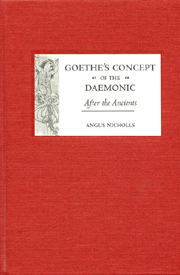Book contents
- Frontmatter
- Contents
- Editions and Abbreviations
- Acknowledgments
- Introduction
- 1 The Ancients and Their Daemons
- 2 The Daemonic in the Philosophy of the Sturm und Drang: Hamann and Herder
- 3 Romanticism and Unlimited Subjectivity: “Mahomets Gesang”
- 4 Werther: The Pathology of an Aesthetic Idea
- 5 Kantian Science and the Limits of Subjectivity
- 6 Schelling, Naturphilosophie, and “Mächtiges Überraschen”
- 7 After the Ancients: Dichtung und Wahrheit and “Urworte. Orphisch”
- 8 Eckermann, or the Daemonic and the Political
- Epilogue: Socrates and the Cicadas
- Works Cited
- Index
3 - Romanticism and Unlimited Subjectivity: “Mahomets Gesang”
Published online by Cambridge University Press: 05 February 2013
- Frontmatter
- Contents
- Editions and Abbreviations
- Acknowledgments
- Introduction
- 1 The Ancients and Their Daemons
- 2 The Daemonic in the Philosophy of the Sturm und Drang: Hamann and Herder
- 3 Romanticism and Unlimited Subjectivity: “Mahomets Gesang”
- 4 Werther: The Pathology of an Aesthetic Idea
- 5 Kantian Science and the Limits of Subjectivity
- 6 Schelling, Naturphilosophie, and “Mächtiges Überraschen”
- 7 After the Ancients: Dichtung und Wahrheit and “Urworte. Orphisch”
- 8 Eckermann, or the Daemonic and the Political
- Epilogue: Socrates and the Cicadas
- Works Cited
- Index
Summary
This chapter will demonstrate the way in which Goethe's early understandings of subjectivity and poetic genius are influenced by texts written by Herder in the late 1760s and early 1770s — texts that were examined in the previous chapter of this study: Fragmente einer Abhandlung über die Ode, Über die neuere deutsche Literatur, and Abhandlung über den Ursprung der Sprache. It is, I will argue, Herder's pantheistic-Leibnizian conceptualizations of Affekt, Kraft, and language that inform Goethe's early depictions of daemonic genius in works such as “Von deutscher Baukunst” (1772) and particularly the poem “Mahomets Gesang” (1773). But before embarking upon an exploration of these texts, it is necessary to address some questions in relation to the aesthetic movement known as Romanticism.
Excursus on Romanticism I
A central contention of this study is that the European Romantic movement offers one of the richest veins of artistic and philosophical material relating to the daemonic in the history of Western culture. This contention is substantiated by a number of studies that focus upon the theme of the daemonic in relation to the works of key figures in the history of both English and German Romanticism. But in order for the term Romantic to have any functional meaning within the context of this study, it is necessary to endow it with a degree of specificity — not so much in terms of the vexing issue of its exact periodization, but rather with regard to its thematic and philosophical content, as well as its role within the history of ideas.
- Type
- Chapter
- Information
- Goethe's Concept of the DaemonicAfter the Ancients, pp. 106 - 141Publisher: Boydell & BrewerPrint publication year: 2006

